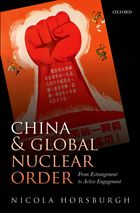 The global management of nuclear weapons and the ascendancy of China in international affairs pose two of the greatest challenges for international security today. Yet we know relatively little about the nuclear dimension of China’s rise, and the extent to which China has shaped global nuclear politics.
The global management of nuclear weapons and the ascendancy of China in international affairs pose two of the greatest challenges for international security today. Yet we know relatively little about the nuclear dimension of China’s rise, and the extent to which China has shaped global nuclear politics.
This new book, published in February 2015 by Oxford University Press, offers insight into these issues by offering an empirically rich study of Chinese nuclear weapons behaviour and the impact of this behaviour on global nuclear politics since 1949. In particular, the book advances the argument that, in the 1960s and 1970s, Maoist China –at the time highly critical of superpower attempts to curtail the spread of nuclear weapons– had a greater hand than previously thought in indirectly creating global nuclear order. Since then, China has become a fully-fledged member of global nuclear order, playing a direct and pivotal role in regional and global nuclear politics.
The book also offers theoretical reflections upon nuclear weapons and global order. The concept of global nuclear order is relatively new, but it has become popular among academics and policymakers working in the nuclear field. It is certainly an innovative lens through which to consider China as a nuclear weapons state because it draws attention to the inner workings –institutional and normative—of nuclear politics. It is also timely: the challenges to global nuclear order today are numerous, from Iranian and North Korean nuclear ambitions to the growing threat of nuclear terrorism. This book considers these challenges from a Chinese perspective, exploring how far Beijing has gone to the aid of nuclear order in addressing these issues.
Dr Nicola Horsburgh
Dr Nicola Horsburgh received an ESRC BICC scholarship to fund an MPhil in Modern Chinese Studies and DPhil in International Relations at Oxford University from 2006 to 2011. She is currently a British Academy Postdoctoral Fellow based at the Oxford Institute for Ethics, Law and Armed Conflict in the Department of Politics and International Relations at Oxford. Dr Horsburgh is also a Stipendiary Lecturer in International Relations at Trinity College, Oxford, a BA Fellow in the Asian Studies Centre at St. Antony’s College and a research associate of the Oxford China Centre
The BICC played an important role in funding the research that lies at the heart of this book. From 2006 to 2011, Nicola was a BICC student (MPhil and DPhil) at the University of Oxford. Through this funding, she was able to conduct extended fieldwork in China and the United States, serving as a visiting scholar at Tsinghua University, Beijing, and as a pre-doctoral fellow at the Center for Nonproliferation Studies in Monterey, USA.
